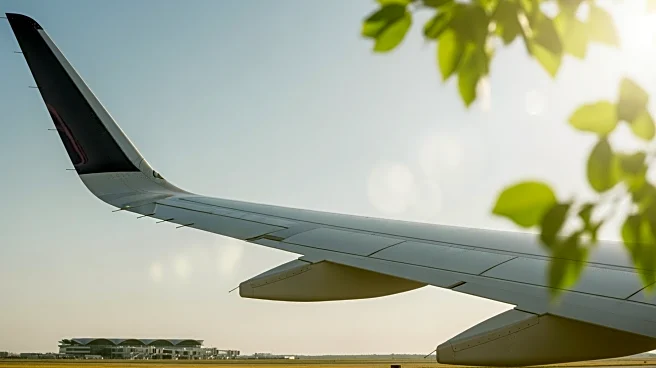What's Happening?
Australia is making strides towards adopting Sustainable Aviation Fuel (SAF), but the transition is hindered by structural uncertainties and lack of government coordination. At the inaugural FACTS Summit & Expo, aviation leaders highlighted the complexities
of the SAF supply chain and the absence of a formal national mandate. Western Sydney International Airport's COO, Matt Duffy, emphasized the need for government intervention to resolve cost and demand uncertainties. Qantas CEO Cam Wallace stressed the importance of SAF for long-haul flights and the need for a domestic industry to reduce costs. Both leaders agree that coordinated government action is essential for progress.
Why It's Important?
The transition to SAF is crucial for reducing the aviation industry's carbon footprint and ensuring sustainable long-haul flights. However, the high cost of SAF compared to traditional jet fuel poses a significant challenge. Without a domestic SAF industry, Australia relies on imports, which increases costs and limits availability. Government mandates and incentives could accelerate the development of a local SAF industry, benefiting airlines and reducing reliance on carbon offsets. The success of this transition could position Australia as a leader in sustainable aviation, impacting global environmental efforts and economic growth.
What's Next?
Aviation leaders are calling for government intervention to establish a viable SAF industry in Australia. This could involve mandates or incentives to build production facilities and reduce costs. The Federal Government's current investment is insufficient, and further funding is needed to support the industry's growth. Collaboration between airlines, such as Qantas and Virgin, is essential to scale up SAF usage. The development of a joint industry body could provide the necessary coordination to advance the SAF transition. Without these measures, the industry may continue to face challenges in achieving sustainability goals.
Beyond the Headlines
The transition to SAF not only impacts the aviation industry but also has broader implications for Australia's energy sector. Developing a domestic SAF industry could stimulate economic growth, create jobs, and enhance energy security. It also presents an opportunity for Australia to leverage its geographic position and feedstock production capabilities. However, the reliance on government action highlights the need for policy innovation and collaboration between public and private sectors. The success of SAF adoption could serve as a model for other industries seeking sustainable solutions.


















